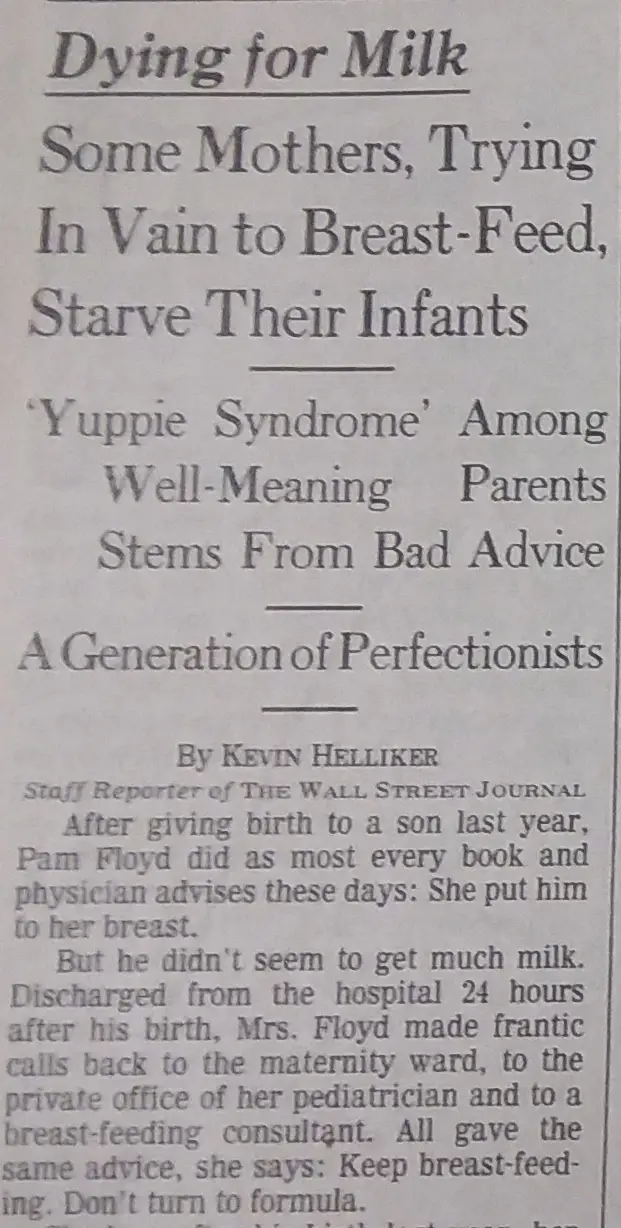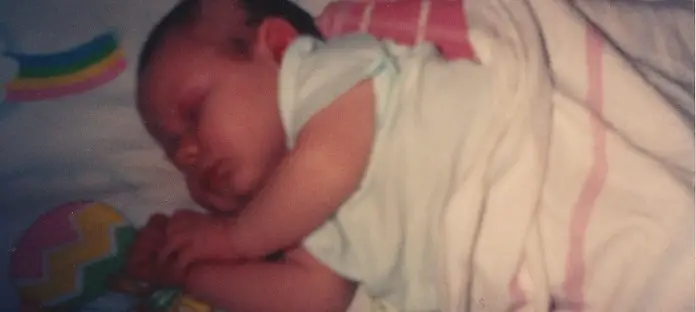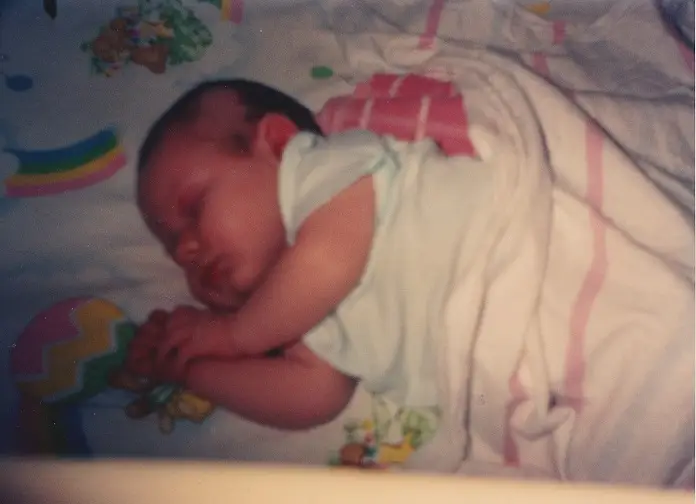By Pam Floyd, Mother and Fed is Best Advocate
Twenty-five years ago, Chaz, the son of Pam Floyd, was born and developed hypernatremic dehydration from insufficient breast milk intake while exclusively breastfeeding. Chaz developed brain injury from dehydration and now lives disabled with cerebral palsy. Their story was published on the front page of the Wall Street Journal. She was subsequently interviewed on 20/20, which prompted a similar feature on ABC’s Prime Time Live. Pam contacted the Fed is Best Foundation to share her story again to warn mothers of the dangers of insufficient feeding.
“25 Year Anniversaries Should Be Celebrated Not Served As A Warning”
Twenty-five years ago my son almost died. He was only six days old. I had chosen to breastfeed, as everyone around me kept reminding me that ‘breast is best.’ So I followed their advice, and I exclusively breastfed. Even though I felt like something wasn’t quite right those first few days, everyone assured me everything was fine. The nurses in the maternity ward suggested that since I was a new mother, I wasn’t able to appreciate how much he was getting. The home health nurse that visited me, courtesy of my health insurance, the day after I left the hospital, reassured me that as long as he was getting six to seven wet diapers a day, then he was getting enough. And the nurses in my pediatrician’s office told me not to worry, that he was a big baby that he would eat when he got hungry. And my personal favorite, “the great thing about breast milk is that you never have to worry about how much or how little he’s getting. Because he’ll always get what he needs.” Well, that works great, if your milk comes in. My colostrum wasn’t enough for my son, Chaz. And my body never produced enough milk to keep a 10 lb. 4 oz. baby boy healthy.
Then when my son’s eyes started rapidly zig-zagging back and forth on that sixth day of life and I called the pediatrician’s office to tell them he was having a seizure, they told me that I didn’t know what I was talking about and that sometimes newborn’s eyes do that as they often wander. Well, the pediatrician finally agreed to see us. We were immediately sent to the emergency room. Then we were transferred to the children’s hospital. There, my son was put into a drug-induced coma until his seizures were under control. His diagnosis was a stroke due to hypernatremic dehydration. Children’s Hospital had me use their hospital grade breast pumps those first few days. The most I ever pumped was 3 cc’s. About a teaspoon. Usually, I just came back with mist. Or what looked like spit. There was never milk. I never got engorged. I never leaked. There was never any milk.
I got mad about this. Especially when I found out that it can and does happen regularly. It didn’t show up in any of my baby books or videos. So I called our local newspaper, The Virginian Pilot, and asked them to write an article about it, they did, it was called, “Mother Knows Best.” That was later revived by a journalist from The Wall Street Journal in an article entitled, “Dying for Milk: Some Mothers, Trying In Vain to Breast-Feed, Starve Their Infants — `Yuppie Syndrome’ Among Well-Meaning Parents Stems From Bad Advice — A Generation of Perfectionists.” We made the front page with that one. Of course, that set off a media frenzy.
It was then that I understood why Chaz had suffered. It was so he could help save other babies. And he did. I heard from those parents. I received letters and phone calls from people saying that thanks to that article in or on whatever magazine, newspaper, television show, or radio show, they got their child to the doctor in time. Not all stories had happy endings. But my son’s near-death experience was saving others.
He was now destined for a life of pain and obstacles. But some way, somehow, we would find a way to make it through. And make it through we have.
But as I scroll through the internet, I see that the problem is still there. The breastfeeding zealots are still winning. They are still bullying moms. They are not allowing moms to use breast and bottle feeding together in hospitals and newborn babies are suffering because of it. They are suffering unnecessarily, and that bothers me. Actually, it pisses me off. I’m okay with you breastfeeding and with you recommending it. But I’m not okay with you jamming it down someone’s throat the way some people do religion. Society has come to terms with the fact that not all women can get pregnant. So why is it so hard for society to understand that not all women can breastfeed? It’s really that simple. You have a woman, that has a baby. She tries to breastfeed. It doesn’t work. She gives a bottle. End of story. No one gets hurt in that story. But if we force this mom to keep putting her aggravated and very unhappy child to her empty breasts, then we are sending mom and baby down a road of no return. You cannot reverse brain damage. And you cannot undo death. Breastfeeding is not worth the risk. It’s not. It’s just not.
So here we are twenty-five years later, why can’t the breast-feeders and the bottle feeders get along? Why does it have to be one or the other? Can’t we coexist? For the sake of the hundreds of thousands that are affected by hypernatremic dehydration each year, can’t we just get along? For the sake of the children at least.
HOW YOU CAN SUPPORT FED IS BEST
There are many ways you can support the mission of the Fed is Best Foundation. Please consider contributing in the following ways:
- Join the Fed is Best Volunteer group to help us reach Obstetric Health Providers to advocate for counseling of new mothers on the importance of safe infant feeding.
- Make a donation to the Fed is Best Foundation. We are using funds from donations to cover the cost of our website, our social media ads, our printing and mailing costs to reach health providers and hospitals. We do not accept donations from breast- or formula-feeding companies and 100% of your donations go toward these operational costs. All the work of the Foundation is achieved via the pro bono and volunteer work of its supporters.
- Share the stories and the message of the Fed is Best Foundation through word-of-mouth, by posting on your social media page and by sending our resources to expectant moms that you know. Share the Fed is Best campaign letter with everyone you know.
- Write a letter to your health providers and hospitals about the Fed is Best Foundation. Write them about feeding complications your child may have experienced.
- Print out our letter to obstetric providers and mail them to your local obstetricians, midwives, family practitioners who provide obstetric care and hospitals.
- Write your local elected officials about what is happening to newborn babies in hospitals and ask for legal protection of newborn babies from underfeeding and of mother’s rights to honest informed consent on the risks of insufficient feeding of breastfed babies.
- Send us your stories. Share with us your successes, your struggles and every thing in between. Every story saves another child from experiencing the same and teaches another mom how to safely feed her baby. Every voice contributes to change.
- Send us messages of support. We work every single day to make infant feeding safe and supportive of every mother and child. Your messages of support keep us all going.
Thank you so much from the Founders of the Fed is Best Foundation!


3 thoughts on “Dying for Milk: The Pam and Chaz Floyd’s Story”